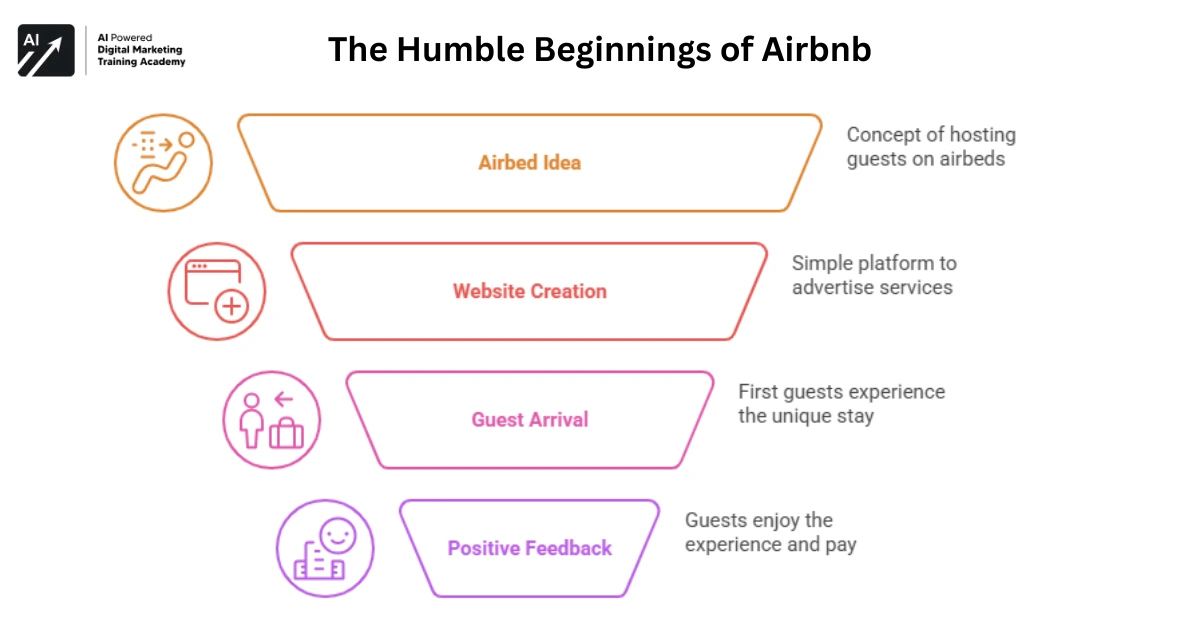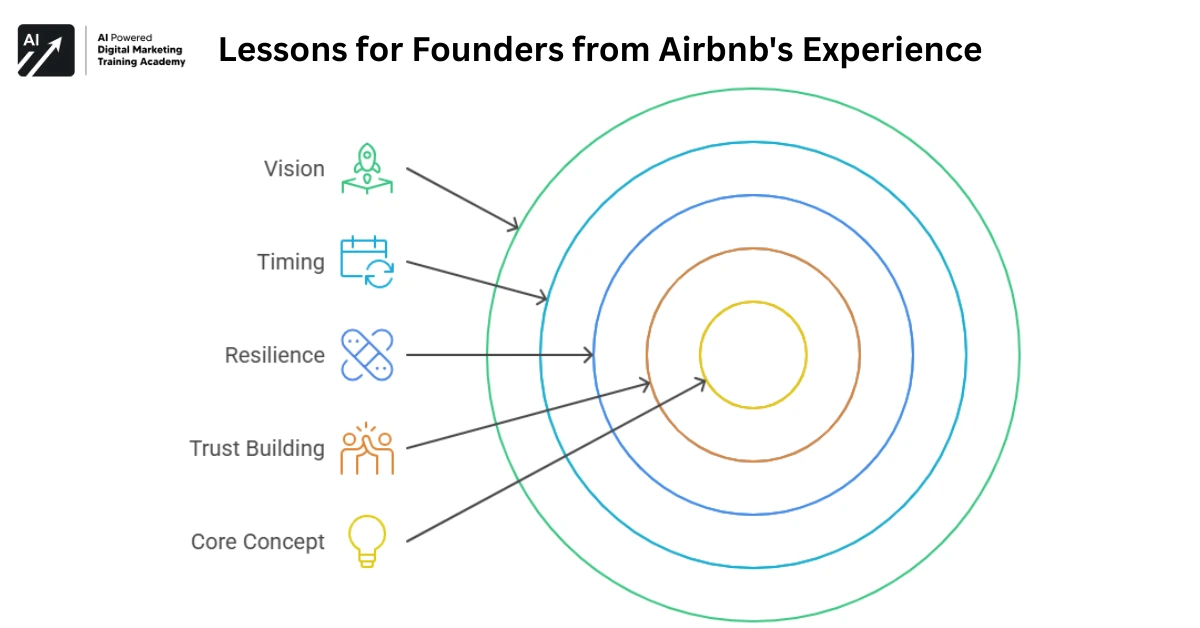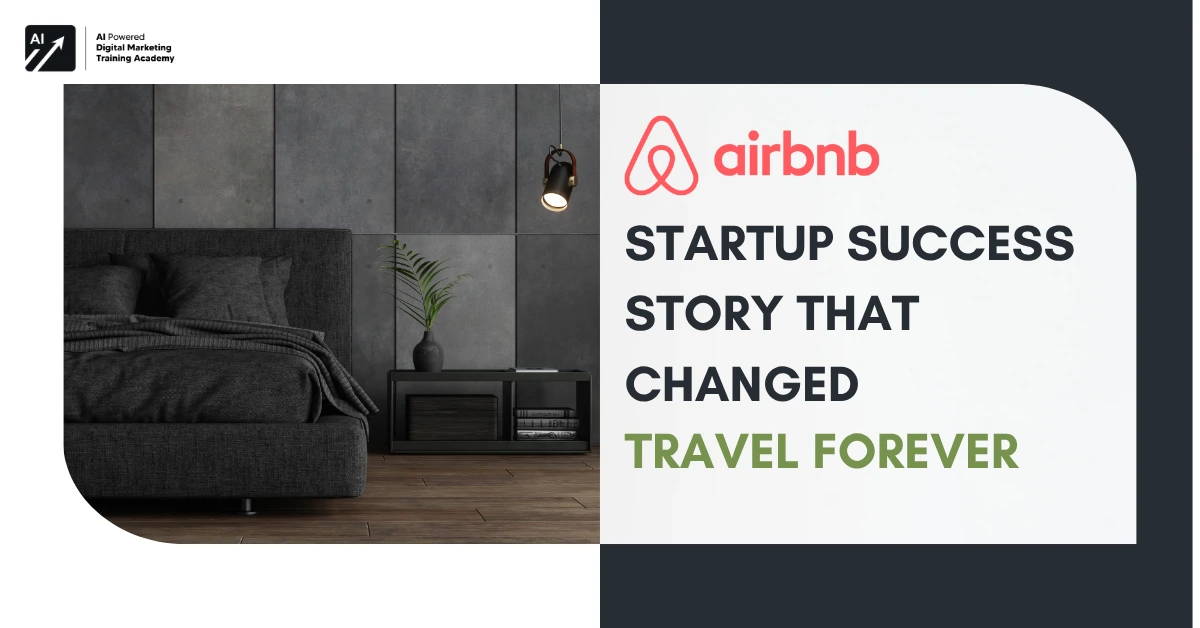Two San Francisco broke roommates were barely able to afford rent in 2007. Instead of taking out a loan or terminating the lease, they did something rare they purchased three air mattresses and created a simple website for offering strangers a place to stay for $40 per night. By the weekend’s end, they’d earned $900.
That humble notion renting out airbeds to strangers transformed into Airbnb, a business worth more than $80 billion
But this was not an overnight success story. The founders encountered hundreds of rejections, a near bankruptcy, and a market that did not believe that strangers would trust strangers
Here’s the amazing story of how Airbnb startup success story the travel and hospitality industries, and why it’s one of the most inspiring Airbnb startup success story of our generation.
The Humble Beginnings of Airbnb

The Founders & The Rent Crisis
Brian Chesky and Joe Gebbia, two recent design graduates, were struggling to make ends meet in San Francisco when they figured they couldn’t pay for the apartment. A design conference was arriving in town, and all the hotels were booked
So, they had a thought: Why not invite guests to sleep on air mattresses in their living room?
They named it AirBed & Breakfast
They created a simple website and advertised with three airbeds, serving breakfast in the morning
Them had three guests a 30-something female, a father of five, and a digital marketer.
All three paid $80 per night, and more significantly, enjoyed the experience
Turning a Weekend Hack Into a Startup
After this early success, Brian and Joe joined forces with engineer Nathan Blecharczyk and decided to make their idea a full-fledged startup
The company’s mission? Create a peer to peer home sharing platform where anyone can become a host and monetize their space by renting it out
They created the first iteration of Airbnb.com, enabling users to post rooms, apartments, or houses for short-term rentals
Investor Rejections: Nobody Believed in the Model
When the three went out to raise money from investors in 2008, nearly all laughed them out of the room
- People won’t invite strangers into their homes.
- Travelers won’t stay in somebody’s apartment.
- Hotels already fix this issue.
They presented to 20+ venture capitalists and were rejected by nearly all of them
Why it was difficult to believe
Existing at the time was couch surfing as a free community model. But making hospitality among strangers pay? It sounded risky, odd, and unscalable
But the founders refused to give up
Creative Hustling: The Cereal Strategy That Saved Airbnb
In 2008, Airbnb was running out of money. They had to raise money to keep going. The U.S. Presidential elections were taking place and the founders had an idea
They released Obama O’s and Cap’n McCain’s special edition political cereal containers and sold them for $40 per container during the elections.
These innovative cereal containers generated headlines and assisted the team in raising $30,000 in cash
This prank not only purchased time but impressed Y Combinator, the prominent startup accelerator, who subsequently accepted Airbnb into their program in 2009.
That was Airbnb’s initial major break
Y Combinator, Growth, and Early Traction
Y Combinator’s Paul Graham recognized the founders grit and creativity, not only the product.
He told them to do the things that don’t scale knock doors, chat with users, take photos of listings themselves
The founders relocated to New York and started signing hosts manually photographing listings, and assisting with descriptions.
This human touch was one of the main growth drivers.
Within months, there were thousands of postings, and visitors started writing reviews. The model of trust was starting to pay off
Airbnb’s Big Break: Events and Timing
Two events accelerated Airbnb’s success
- South by Southwest (SXSW) Festival Airbnb got together with attendees to provide cheap accommodations once the hotels sold out.
- 2010 World Cup in South Africa Thousands of tourists used Airbnb to discover homes around the stadiums
These massive events proved that Airbnb was scalable at a global level, particularly when there was limited or expensive hotel supply
Trust, Reviews, and the Power of Community
Fundamentally, Airbnb incorporated trust into the platform with profile verifications, safe payments, host and guest reviews, and an open system
It wasn’t just about housing. It was about community-hosted hospitality
Hosts were graded, guests were graded, and eventually, the system developed its own safety net. Now, trust and social proof are cornerstones of Airbnb startup success story
Going Global: From SF to 220+ Countries
Today, Airbnb
- Has more than 4 million hosts
- Has presence in 220+ countries
- Has enabled more than 1 billion guest arrivals
- Provides stays from budget rooms to castles, yachts, and treehouses
And it all began with an air mattress
The IPO: $100 Billion Debut in 2020
In spite of 2020’s pandemic, Airbnb came public in December and experienced one of the largest and most successful IPOs in history.
- Debut valuation: $100 billion
- Share price more than doubled on day one
- Overtaken hotel giants such as Marriott and Hilton in market value
Investors who laughed earlier now wished they had bought it early.
Airbnb’s Business Model Breakdown
Here’s how Airbnb generates money:
- Commission from Hosts (3-5%)
- Service Charge from Guests (6-12%)
- Experiences – Local activities, tours, and experiences led by locals
- Airbnb Luxe & Airbnb for Work – Upscale properties for business and luxury travel
- Airbnb does not own a single room. But it’s worth more than the average hotel chain.
Lessons for Founders from Airbnb’s Experience

- Start Small, Think Big – A $40/night mattress concept that turned into an international business
- Solve Real Problems – They solved a problem of a lack of affordable accommodations in peak events
- Build for Trust – Community reviews and safety inspections made it succeed
- Don’t Fear Rejection – Airbnb was turned down by almost every early investor
- Stay Scrappy – Cereal box selling kept the company going through lean times
- Timing Matters – Large events served them well in scaling rapidly when supply was tight
Conclusion
Airbnb is one of the all-time greatest startup tales. It demonstrates that big ideas, coupled with dogged execution and innovation, can disrupt even the most entrenched industries
From living room air mattresses to welcoming presidents and billionaires Airbnb transformed the meaning of travel
But most importantly, it transformed the meaning of starting that no matter how little money, no contacts, and no experience you have in an industry, you can create something the world can’t help but notice.







